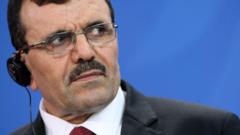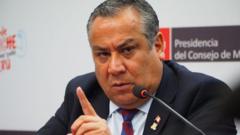Former Prime Minister Ali Laarayedh's conviction raises concerns over President Kais Saied's authoritarian tactics, with numerous critics imprisoned.
**Tunisia's Ex-Prime Minister Receives 34-Year Sentence Amidst Political Turmoil**

**Tunisia's Ex-Prime Minister Receives 34-Year Sentence Amidst Political Turmoil**
A court ruling on terrorism charges against Ali Laarayedh highlights alleged political repression in Tunisia.
A Tunisian court has handed a 34-year prison sentence to Ali Laarayedh, the former Prime Minister, as part of a wide-ranging ruling on terrorism charges. This sentencing is part of a broader crackdown on dissent against President Kais Saied, who has faced criticism for alleged authoritarianism in his governance.
Laarayedh, aged 69, has been a vocal opponent of President Saied and is affiliated with the Ennahda party, the largest political party in parliament promoting Islamist principles. Together with seven other individuals, he was accused of organizing a terrorism cell and facilitating the travel of young Tunisians to conflict zones in Iraq and Syria to join extremist groups.
In a letter to the court's prosecutor, Laarayedh countered the accusations by asserting, “I am not a criminal… I am a victim in this case.” Despite his denial of any wrongdoing, he was sentenced on Friday, with human rights advocates claiming the case is politically charged.
Critics highlight that at least 40 opposition figures, including diplomats, lawyers, and journalists, have recently been jailed, reinforcing a narrative of systematic oppression against political adversaries. Rights organizations assert that the judicial processes under President Saied's regime reflect an attempt to undermine political opposition since he dissolved parliament in 2021 and began ruling by decree.
The president has faced backlash for amending the constitution to expand his authority since taking office six years ago. Laarayedh, who was arrested three years prior, became a focal point for calls for political freedoms, with organizations like Human Rights Watch describing his case as emblematic of the regime's efforts to silence dissenting voices by branding them as terrorists.
The political landscape in Tunisia has dramatically shifted since the Arab Spring uprisings, which began in the nation where disparaged citizens called for reform. However, many Tunisians now feel that hard-won democratic freedoms are eroding, attributing this backslide to Saied's consolidation of power.
In defiance of both domestic and international criticism, President Saied insists he is combating "traitors" and is facing "blatant foreign interference" in governance matters.



















